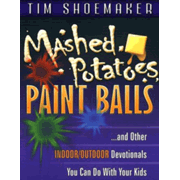
Family, Work, & Faith: Interview with Author, Tim Shoemaker
Do you struggle balancing your family and work, and wish you knew how to inject more faith conversations into both?
This week, I want to share an excerpt from an interview I did with author, Tim Shoemaker in 2013. It’s one my favorites. He shares what he has learned in his parenting and in his writing journey–about being wise and brave with the opportunities God provides. These are truths that are relevant and helpful to us all.
If you haven’t met Tim, allow me to introduce you to him.
Tim Shoemaker is the author of eleven books including The Very Best Hands-On, Kinda Dangerous Family Devotions and Smashed Tomatoes, Bottle Rockets…and Outdoor Devotionals You Can Do with Your Kids.
Not only does he write devotionals for parents, but he also writes suspense fiction for tweens and young adults.
In May 2013, his book, Code of Silence, was named in the Top Ten List of Crime Novels for Youth in Booklist Online. He’s written numerous books of which you can learn more about at his intriguing website, http://www.timshoemakersmashedtomatoes.com/.
Tim speaks at “churches, para-church organizations such as Focus on the Family, Iron Sharpens Iron Men’s Conferences, International Network of Children’s Ministry, Moody Pastors Conference, at men’s retreats, women’s groups, couples’ retreats, Youth Worker conventions, homeschool conventions, and conducts Family Devotion Workshops all across the country.”
Many of Tim’s experiences as a father inspired his writing. I always find his words encouraging. I ‘m sure you will as well.
Enjoy the interview.
Tim, thanks for carving some time out of your schedule for this interview. I know you’ve been writing and speaking full-time since 2004. How many years did you write before doing it full-time? Share with us how your writing journey began.
I’ve been writing since sometime in the early 90’s, at least. I wrote things for my three sons, mainly. Most of the writing was family devotional things that I did with the kids—object lesson and activity-oriented stuff to teach spiritual truth. I also loved telling them stories, and they’d ask me to write them down. In time, I started doing that.
And my youngest son had a hard time reading—so to encourage him along I wrote stories for him—at his reading and interest level. What I didn’t see at the time was that God was preparing me to write for a bigger audience.
I notice your writing falls into two categories: one for parents and youth workers and the other is fiction for boys. First, I want to ask about your writing for parents and youth workers. What drew you to this genre?
As a dad, I struggled to effectively teach my boys about God and the principles he gave us to live by. I had a stack of books for family devotions, none of which really worked for long. Then I started doing little object lessons to teach spiritual truth. Blowing up eggs in the microwave. Smashing tomatoes. Shooting model rockets. All kinds of things. The boys listened. Learned. Enjoyed it. And with every object lesson or activity, they were getting a nugget of truth etched into their mind.
So eventually I started writing them down—thinking maybe my sons could use them with their own kids when they grew up. Then, at a writer’s conference, I was showing an acquisitions editor some fiction—and it was clearly with the wrong publishing house for that. “What else do you have?” he said. I almost answered “nothing” because the fiction was all I’d planned to present. That was my dream.
Then, the devotionals popped into my mind. I mentioned them—and he loved the examples I was giving him. The devotionals were written with all the passion of a dad’s love—and that started a series of books. I had no idea God was using the writing I was doing for my kids to launch something bigger.
Since I struggled to teach my kids, I totally understood other parents—especially dads—as they wrestled to convey spiritual truth in a way that their kids would listen. God developed a passion in me to help them, too. That’s where the speaking came in.
As for writing for youth workers, that was a natural path to take. I’d been working with youth for years. The same devotionals that worked for my boys at home worked for kids in a youth group. Really well. So, when Group Publications approached me about doing a book, by God’s grace I was ready. Isn’t it amazing how God paves the way without us even being aware of it?
Writers hear about building their platforms. Any thoughts you would like to share about that?
That’s a tough one, because my story isn’t all that typical. I had seven books published before I ever had a platform. But I was busy with work, my family, and in ministry at church. When we had to close our business in 2004 I felt I was to go “all in” on the writing. I thought God was going to open the doors for the fiction writing. That didn’t happen. Not for years.
But God was working in me. Changing me. Making me the person I should be so I could do the job he had for me. I was talking to a pastor friend, sharing my burden for men and how they often avoided teaching their kids spiritually. “If I could just get men in a room,” I said, “I know I can help them over the hurdles holding them back.”
He looked at me. “Why don’t you come and do it at my church?” It hit me so hard. When I said that thing about getting men in a room, it was a figure of speech. I didn’t really mean I wanted to get men in a room and speak to them.
I was scared to death. But I knew I was supposed to do it—so I did. And when I did, I found just how needed it was—and how easily men could be helped. It launched a speaking element of my life that I hadn’t pursued or manufactured.
Sure, I had to do the work, don’t get me wrong. But God brought the opportunity to me. He put the burden in my heart. My job was not to run away and hide from it—even when I was so afraid to do it.
So the lesson there is if God puts some opportunity in front of you—even if you think it is miles out of your comfort zone—think really hard before saying “no” to it. If I had declined, I would have missed so much. And there is a timing factor to it.
Don’t force a platform before you’re ready. Believe me, I wish I’d have been ready when I was younger. But God knew when I was ready—and he opened the door. Two, if you’ve got kids at home—they’re your priority. Be really careful about doing something that will hurt your influence at home or the time you should be having with your mate and kids.
Also, if you are a Christian—and you’re writing for Christians—watch your walk. Be the real deal. Don’t cut short your time with God so that you can write.
Don’t be discouraged. If this is part of God’s purpose for your life, then you can be sure he is going to help.
I know your three sons are now grown, but how did you balance your writing and speaking engagements when your sons were younger and still at home?
I’m glad you’re zeroing in on this because I think it’s important. My two older boys were in college when the speaking really started. My priority was my kids—so God in his grace didn’t really bring the speaking opportunities until later.
And it makes sense, doesn’t it? Should I really be out telling people how to raise their kids when mine aren’t raised yet? I think some try to get into a speaking ministry a bit young—and it is something to be really careful about.
For the last few years, my wife usually travels with me when I speak, unless it’s a men’s retreat or a writer’s conference. This is a really important thing. We stay close. Have time together. Go out on a date after I’m done speaking.
With the writing, I have to be careful not to push it into the evening. My wife is good about helping me stay balanced. I usually write off in a quiet spot or behind a closed door, but my wife and kids have to be my first priority. If I don’t get that right—what do I really have to share with others?
I heard a writer say once “My kids know when I’m on a deadline—and my door is shut—that I’m not to be bothered.” They laughed and remarked how that it wasn’t unusual for their door to be shut like that for several weeks. The audience laughed. And I grieved for her. She’d missed the mark. She was so busy with her message for the masses she didn’t think about the message she was sending to her kids.
No book we’ll ever write is more important than our kids.
Thank you, Tim for those wise words.
No matter what line of work or hobbies we pursue, we must remember our first love, our Lord, and the precious gifts He has given to us, our families.
Friends, I’d like to share an affiliate link to one of Tim’s books available at Christian Book..com. We have a copy of this book at my house and I can assure you, your kids will remember these moments!
(Clicking on the title will give you more information and a better picture.)
 |
Mashed Potatoes, Paint Balls and Other Indoor/Outdoor Devotionals You Can Do with Your Kids By Tim Shoemaker / Wingspread Mashed Potatoes, Paint Balls… offers 24 activity-based devotionals for outdoors and indoors that kids will enjoy. Each devotion includes an introduction, materials list and introduces a Biblical concept through a fun and engaging activity. |
Check this one out as well. Electrocuting a pickle sounds like something my son would find intriguing! It makes you wonder about what devotion goes along with it, doesn’t it?
 |
The Very Best, Hands-On, Kinda Dangerous Family Devotions: 52 Activities Your Kids Will Never Forget
Regular family devotions are important. Unfortunately, they’re often…boring. But what if devotions looked less like sitting still and listening to someone read and more like, say, eletrocuting a pickle? Or converting a leaf blower into a toilet paper launcher? Or lighting toothpaste on fire? These hands-on, kinda dangerous, totally unforgettable object lessons (along with nearly fifty others) are not only more fun than other family devotions–they actually deliver the spiritual impact you desire for you kids. So put away the flannelgraph, get out the safety goggles, and start bringing the truths of Scripture to vivid life in your household. Just remember to change out of your Sunday clothes first. |




